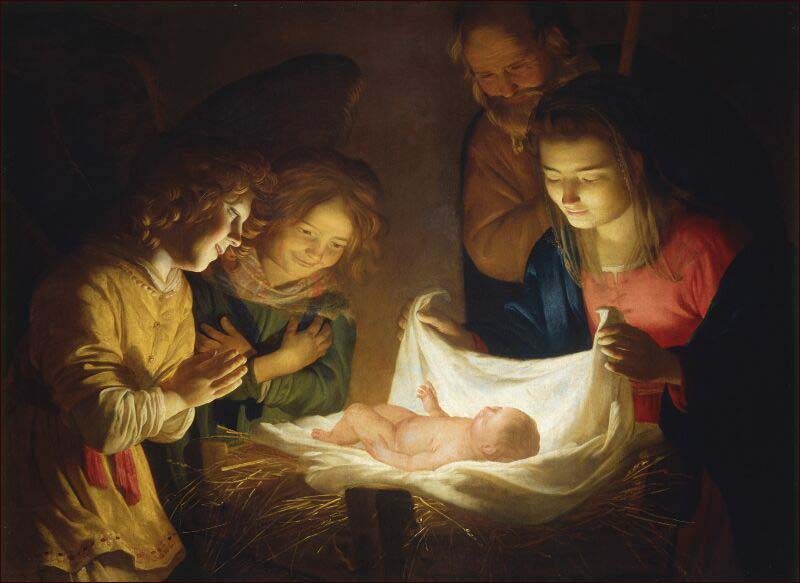

Deacon John Stanley
How long is the Christmas season? When are we to take down the Christmas tree and store the Christmas decorations for the next year? I invite you to take this quiz: How long should Catholics continue to celebrate Christmas?
A. Until January 1st – the Solemnity of Mary, Mother of God – the 8th day (octave) of Christmas
B. Until January 6th, traditional Epiphany, the “12th day of Christmas”.
C. The feast of the Baptism of the Lord (Sunday after the Sunday celebration of Epiphany)
D. Super Bowl Sunday (or the feast of the Presentation, whichever comes first)
E. None of the above: “I’m throwing out my Christmas tree the day after Christmas; I’ve had it up since Thanksgiving and it is so dry and brittle that a spark of static electricity will send everything up in smoke!”
If you answered “A” or “B”, you get partial credit. If you answered “D” or “E”, I’m at least glad that you picked up The Ascent to read this article. Please continue to read. Even if you correctly answered “C”, do you know why?
It seems strange that the Christmas season should continue until the feast of the Baptism of the Lord. The historical explanation:
In the early Church, Christians, particularly those in the East, celebrated the coming of Christ on Jan. 6. On that festive day known as Epiphany, the Church celebrated not only the Nativity but also the visitation of the Magi, the Baptism of Christ, and the wedding feast of Cana. By the fourth century, in some dioceses, both Christmas and Epiphany had been set as separate feasts. In 567, the universal Church set these feast days on Dec. 25 and Jan. 6, respectively, and named the twelve days between the feasts as the “Christmas Season.”
But the Christmas season no longer ends on January 6, because eventually, some dioceses, and eventually the entire Church, made the feast of Epiphany more solemn by adding an “octave” – an extension of the celebration for a week after the feast.
When this happened, the Christmas season no longer ended on Epiphany but continued through the octave. The feast of the Baptism of the Lord was eventually placed at the end of the octave… and now, even though there is no longer an official octave of Epiphany, the celebration of the Baptism of the Lord remained in place and the Church continued the Christmas season until the Lord’s baptism.
Okay, so much for the history, but that doesn’t answer the WHY question. Theologically, why is the Lord’s baptism the other bookend to the Christmas season? Why do Catholics continue to sing Christmas hymns for over two weeks after December 25?
Celebrating the miracle of the virgin birth is incomplete if we do not also celebrate and contemplate His Divinity. Jesus is true God and true Man. We cannot celebrate Christmas without also celebrating the maternity of Mary, Mother of God. At the council of Ephesus in 431 and the Council of Chalcedon in 451 the Church upheld the teaching of Mary as Theotokos, the God bearer, the Mother of God. More importantly, it declared that Jesus is true God and true man. He is the son of God AND the son of Mary.
Throughout the Octave of Christmas, culminating on January 1st, with the celebration of the solemnity of Mary, Mother of God, the Church provides us with beautiful liturgies celebrating the infancy and childhood of Jesus. Also included in the Octave is the beautiful feast of the Holy Family which is celebrated on the Sunday following Christmas. To remind us of the “reason for the season” – GOD BECOMING MAN for the purpose of suffering and dying for our salvation, the Church also commemorates the first martyr, St. Stephen on the day after Christmas, St. John the Evangelist on December 27th and the feast of the Holy Innocents on December 28th. Attending Mass those three days immediately after Christmas is a beautiful way to begin our celebration of the Christmas season.

The life of the son of Mary and Joseph remains mostly hidden for 30 years. His manifestation to the world began with the shepherds and the Maji. With the exception of Mary and Joseph and a few others (John the Baptist comes to mind), the divine nature of Jesus was unknown until the Trinitarian manifestation at the Jordan River. There, the Holy Spirit descends in the form of a dove and God’s voice from Heaven is heard: “Behold, my son in whom I am well pleased”.
Too many in the world only acknowledge Jesus as a great prophet, or a great teacher or wise sage. The commercialization/secularization of Christmas results from this mindset. This Christmas and this entire Christmas season – from the Vigil Mass through the Octave of Christmas, the celebration of the Theotokus, Mother of God and continuing to the divine manifestation at the Baptism of the Lord – let us rejoice, celebrate and contemplate our salvation in the coming of the newborn King, Jesus Christ, true God and true man. MERRY CHRISTMAS (season)!
